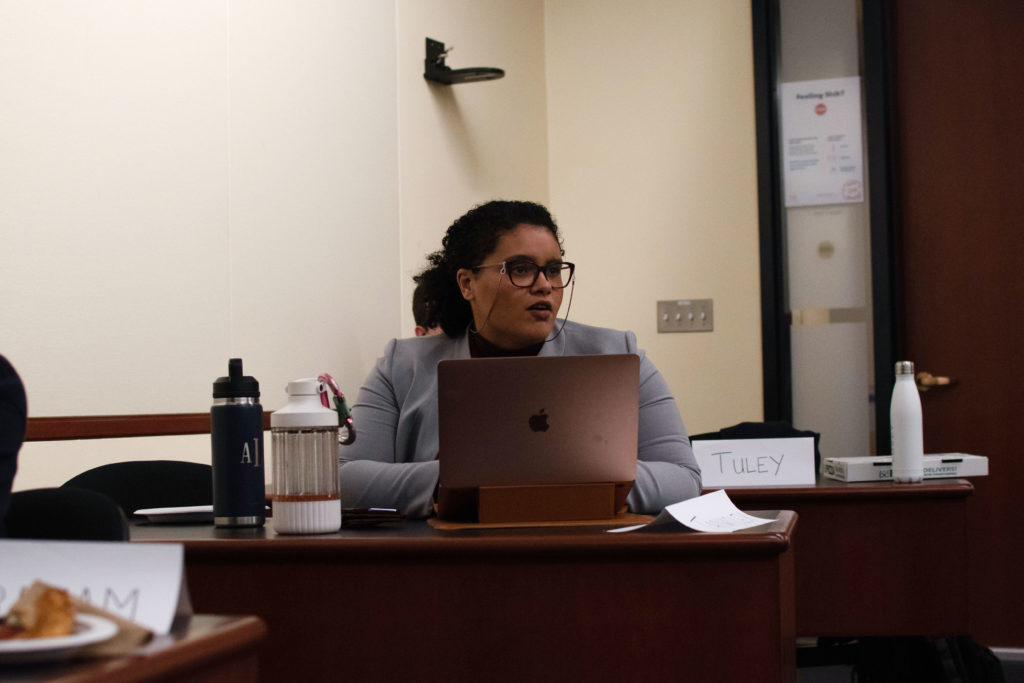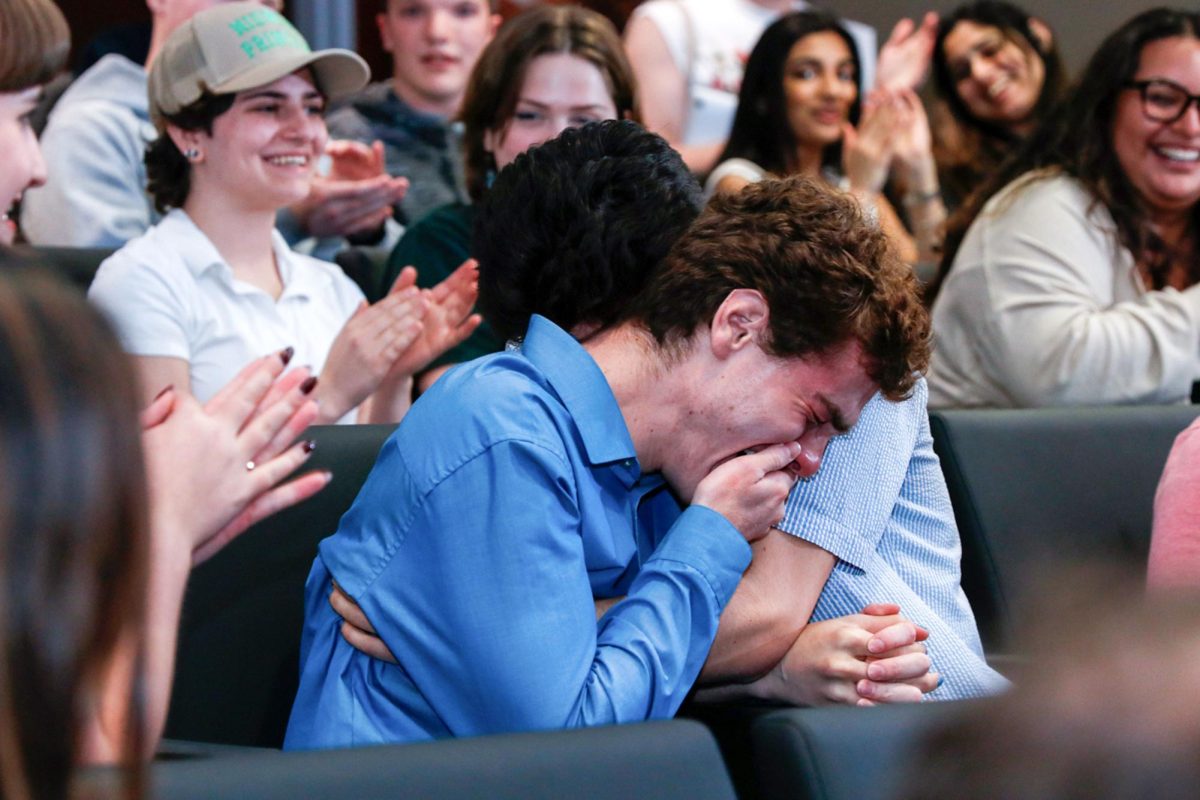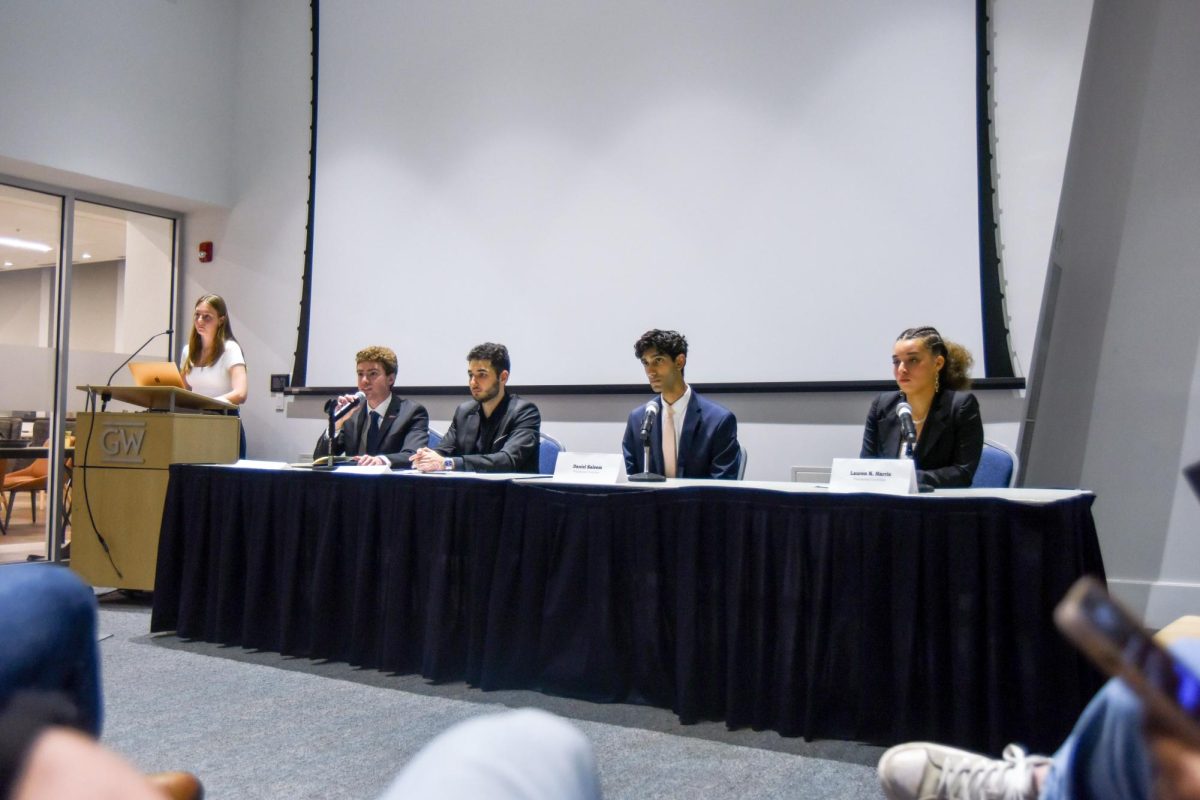The Student Bar Association Senate unanimously approved a resolution finalizing a project to fill menstrual product baskets previously placed in law school bathrooms Tuesday.
The Menstrual Equity for All Act calls on officials to provide menstrual products in all law school bathrooms year-round, requiring the chair of the Senate’s Student Life Committee to coordinate with the senior associate dean of administrative affairs to oversee the refilling of baskets. SBA Sen. Leila Diallo – the bill’s sponsor and the chair of the Student Life Committee – said in compliance with D.C. law, officials ordered 400 menstrual product dispensers which will arrive and be installed in bathrooms to replace the baskets by late February or early March.
“It’s been an ongoing project since last semester, and at each meeting, I brought you an update on conversations I’ve had with the administration,” she said.
The Senate also unanimously approved the charter of several student organizations, including the Parents-in-Law Association, the Womxn of Color Collective and the Middle Eastern and North African Law Association.
Elly Mejia Castro, who advocated for the Parents-In-Law Association, said graduate students who are parents lack a supportive community. Mejia Castro said the organization will lobby the University to provide childcare for graduate students, but she is not optimistic it will happen before her graduation in 2025.
“Being a parent in law school is terrible,” Mejia Castro said. “And that is why I created this org, because not only is it terrible in law school, but there’s apparently no community at large here for parents, for graduate students.”
SBA Sen. Anissa Tanksley, the chair of the Student Organization and Charter Committee, said the Womxn of Color Collective will build a community for women and nonbinary people of color and discuss how to improve gender and racial discrimination as aspiring lawyers.
Jasmine Masri, one of the founders of the organization, said the Middle Eastern and North African Law Association will revive a community-building organization that was last active two years ago.
The Senate also approved the creation of the Civil Liberties and Civil Rights brief, a blog students can use to practice writing legal arguments. Benjamin Banker, one of the organization’s founders, said peer law schools like Georgetown Law have similar blog programs.
“Because there are no opportunities on campus to engage in such writing, we’re really excited to be going through this process,” Banker said.
The Senate unanimously approved ad hoc funding – which the SBA sets aside to provide for last-minute student organization funding requests outside their allocated budgets – to reimburse three organizations for events and to send eight students to conferences.
The Asian Pacific American Law Student Association and the South Asian Law Student Association were jointly reimbursed $107.66 each for an alumni panel held Jan. 29. Madeline Ochi, the director of outreach and alumni engagement for APALSA, said the panel featured networking opportunities and job search advice.
“I think this was a really important event for students and for them to learn about experiences as an AAPI lawyer,” Ochi said.
The senate unanimously approved $600 in ad hoc funding for the Space Law Society to send eight members to the American Bar Association’s Forum on Air and Space Law in February.
The Senate also unanimously passed a resolution of appreciation for Tammy Tideswell, the senior associate dean for administrative affairs at GW Law, acknowledging her work for the school since her arrival in 2020. Tideswell is leaving her position this week.
Senators passed a resolution 16-4 to adjust the requirement to hold a general meeting from once per semester to once per year. The SBA held its annual State of the School Thursday.
SBA Sen. Yolanda Heman-Ackah, who voted against the resolution, said she was worried reducing the number of required meetings would increase division between the executive and legislative branches by reducing the amount of time they are required to meet with one another.
Senators unanimously passed the Recorded Audiovisual Requirements Act, which removes the requirement for the Senate’s appointments committee to record interviews with candidates. Senators also passed 17-1 the Director-Level Membership Confirmations Act which removes the requirement for the senate to confirm all members of the SBA elections committee.
Heman-Ackah, the resolution’s sole dissenter, said she was concerned it would create a lack of balance between the executive branch and the legislative branch.
Senators unanimously passed a bylaw reform for the attorney general, removing the requirement for the SBA’s attorney general to petition the University to grant the law school self-governance. SBA Sen. Evan Barber, who sponsored the resolution, said in previous years the SBA required the attorney general to advocate for self-governance, but it is an unrealistic expectation.
“It’s never going to happen,” he said. “Self-governance by us, over us, exclusive of the University, is not real.”
Senators failed to pass the Act Directing Matriculated Integration and Transition of Students in an 8-8 vote. The resolution would have amended the bylaws to require the SBA executive branch’s vice president of first-year law students to refer any questions relating to the SBA senate to the appropriate senator.
SBA Sen. John Tuley, who voted against the resolution, said he felt the resolution was “over-legislating.” He said the vice president of first-year students should refer relevant questions to the executive vice president, who could then forward it to a senator without being required by the bylaws.
Senators unanimously passed a resolution to seek an advisory opinion from the Supreme Court of the SBA about the Senate’s authority to delegate setting the spring election schedule to SBA President Nicole Karem and the elections committee, when historically the Senate has been required to schedule the election. The Senate requested the court to advise on which responsibilities they retain when setting the schedule with Karem.
SBA Sen. Bernard Baffoe-Mensah said he wants to create a food pantry and find other resources to alert students of free food on campus. Baffoe-Mensah said he hopes to work with The Store, which provides free grocery access to students regardless of degree level, to secure donations and utilize their existing partnerships with community organizations like the Capital Area Food Bank.
The next SBA Senate meeting will be held on Feb. 7 at 9:15 p.m. at the Law Learning Center.











